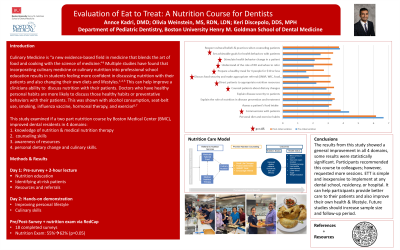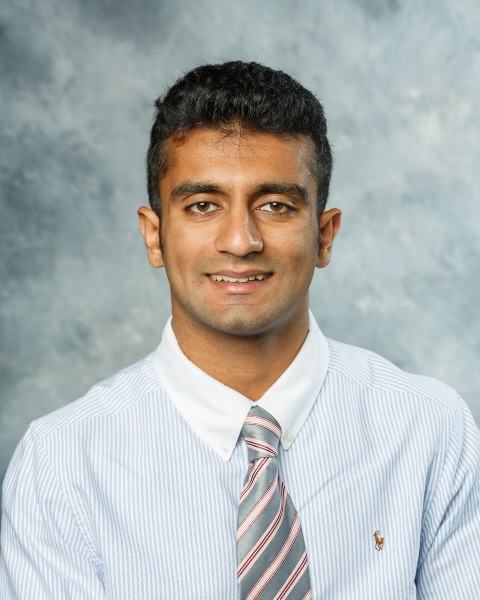Preventive
299 - Evaluation of Eat to Treat: A Nutrition Course for Dentists


Annce S. Kadri, DMD (he/him/his)
Resident
Boston University School of Dental Medicine
Boston University
Boston, Massachusetts, United States- CC
Christine S. Chiao, DMD, MS
Boston University School of Dental Medicine
- KD
Keri S. Discepolo, DDS
Boston University School of Dental Medicine
- OW
Olivia Weinstein, MS, RDN, LDN
Boston Medical Center
- KD
Keri Discepolo, DDS, MPH
Post Graduate Program Director of Pediatric Dentistry
Boston University Henry M. Goldman School of Dental Medicine
Boston, Massachusetts, United States
Presenting Author(s)
Co-Author(s)
Program Director(s)
Purpose: This study examined if a two part nutrition course by Boston Medical Center (BMC), improved dental residents in 4 domains: knowledge of nutrition and medical nutrition therapy, counseling skills and awareness of resources, personal dietary change and culinary skills.
Methods: Eat to Teat (ETT) involved a 2-hour lecture and a 2-hour hands-on demonstration at the BMC Teaching Kitchen. The lecture focused on nutrition education and identifying at-risk patients. The hands-on demonstration focused on improving lifestyle and culinary skills. Pre/post-program surveys measured change in knowledge, attitude, self-efficacy and confidence to treat patients. Personal health/lifestyle was rated on a scale of 1 (very-unhealthy) to 10 (very-healthy); Ability to communicate with patients was rated on a scale of 1 (not-confident) to 5 (very-confident).
Results: Twenty-three residents were enrolled and 18 completed surveys. Of those with complete survey data, the mean age was 30.5 (SD=4.48). Self-reported results for personal health/lifestyle decreased from 6.5 to 6.2 (p=0.08) and ability to: counsel patients about diet increased from 2.8 to 3.4(p=0.02), ability to direct patients to appropriate nutrition resources increased from 2.2 to 3.2(p=0.002), confidence in discussing food security and refer to relevant programs increased from 1.9 to 3.2(p=0.0003), prepare a healthy meal increased from 1.7 to 2.8(p=0.002). The residents scores on the nutrition knowledge exam increased from 55% to 62% (p=0.05).
Conclusion: The results from this study showed a general improvement in all 4 domains, some results were statistically significant. Participants recommended this course to colleagues; however, requested more sessions. ETT is simple and inexpensive to implement at any dental school, residency, or hospital. It can help participants provide better care to their patients and also improve their own health & lifestyle. Future studies should increase sample size and follow-up period.
Identify Supporting Agency and Grant Number: Research supported by Boston Medical Center Teaching Kitchen and Boston Medical Center Food Pantry

.jpg)